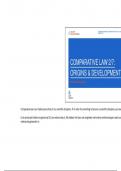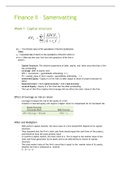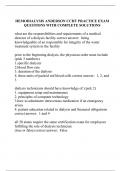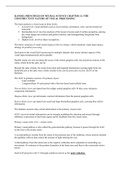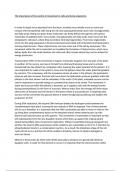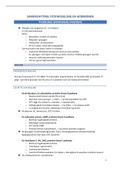DEPARTMENT DEPARTMENT OF INTERDISCIPLINARY STUDY OF LAW,
BUSINESS LAW
COMPARATIVE LAW 2/7:
ORIGINS & DEVELOPMENT
Prof Dr Cosmin Cercel
Comparative law is an intellectual activity. It is a scientific discipline. → In order for something to become a scientific discipline, you nee
In de eerste ppt hebben we gezien dat CL een wetenschap is. We hebben het toen ook vergeleken met andere wetenschappen zoals soc
wetenschap geworden is.
, INTRODUCTION
▪ Learning material: specified reading in the reader (available on Ufora)
• DONAHUE, “Comparative Law Before the Code Napoléon”, p. 3-28
• LAITHIER, “L’évolution historique du droit comparé”, p. 3-14
• MAKDISI, “Scholasticism and Humanism in Classical Islam and the Christian West”, 8 p.
▪ Learning objective: ≠ (it is not about recalling) all details, authors, works, dates, ...
= (it is about) understanding the interconnection between
✓ comparative law and reality: socio-economic, political & legal
(what is/was law)
✓ perceptions/beliefs: ideology and legal theory/doctrine (what did people think law
is/was)
▪ Function of the lectures - main lines of evolution comparative law in light of the evolution of law/leg
a narrative)
- highlighting key points to remember or noteworthy elements
Deze les gaat over de geschiedenis van CL. → Belangrijk: Voor de 18e eeuw kan je eig niet spreken van comparative law as a discipline. A
gevormd als comparatists. → Dus: Voor de 18e eeuw is er nog geen sprake van cl as a discipline. Mensen deden wel al aan comparisons,
comparisons is dan later wel handig geweest om echt de overstap te maken naar een discipline.
SAMENVATTING:
- In de Antiquity was er niet echt comparative law. De grieken zochten naar the ideal law. De Romeinen hadden niet echt aandacht voor
- 2nd half of the middle ages: The whole West European legal landscape was a mess. Dit kwam door de val van het West Romeinse rijk.
- Rond de 13e eeuw ontstonden er universiteiten. Dit kwam door interactie met de Islamic world. Dit is een belangrijk moment in de evo
elementen om een wetenschap te kunnen uitbouwen is de aanwezigheid van een main institutional basis for producing science (= een
- 13e eeuw tot 17e eeuw: Jurists were trying to accomodate the plurality of legal orders with the ius commune. Ze probeerden dit ius com
comparisons. Het doel hierbij was om de vele legal orders te integreren in één legal order, namelijk dat van het ius commune.
, OVERVIEW
▪ Antiquity (pre 500): only a few traces of ‘comparative law’
▪ 1st half of the Middle Ages (500-1000): little to be found
▪ 2nd half of the Middle Ages (1000-1500): important, but di
concept from present [slides 2-4 & 2-5]
▪ ‘New Age’ (1500-1800): sporadic isolated appearance [slid
to 2-8].
▪ 19th Century: CL ‘taking roots’ – a systematic approach [s
12 & 2-13]
▪ From 1900 onwards: a ‘blossoming’ comparative law in a
contemporary sense [slides 2-13 to 2-17]
Meestal zegt men dat de origin of comparisons ligt bij de politics van Aristoteles. Aristoteles en zijn volgers hebben namelijk meer dan 10
voornaamste doel hierbij was finding the ideal organisation of society. Ze hadden hier een Grieks woord voor: Nomos. We vertalen dit van
over alles wat te maken heeft met organisatie. Het tegengestelde van nomos is chaos. Ze waren dus op zoek naar de beste manier om hu
allerlei grondwetten van Griekse steden te vergelijken. → Toch kan je nog niet echt spreken van comparisons. Hiervoor zijn een aantal red
niet spraken. Ze vergeleken dus eigenlijk enkel soortgelijken. (2) Ze hadden geen aandacht voor private law. Ze hadden namelijk enkel aa
organiseren. → Dit is dus de Griekse antiquity.
De Romeinen hadden wel meer aandacht voor vreemd recht. Zij maakten namelijk een onderscheid tussen verschillende ‘soorten’ recht
van konden maken. Alleen de burgers die binnen de muur woonden konden dit dus gebruiken. De mensen buiten de stadsmuur waren de
van tijd werden die vijanden soms ook hospes (= gasten). Deze hospes hebben hun eigen soort legal protection. Ze hadden dus hun eige
mix was tussen het recht van binnen en buiten de muur: Ius perigrini: Dit is het recht van foreigners waarmee de romeinen handel dreven
Tijdens de Romeinse periode waren er jurisprudents zoals bvb Gaius. They started to develop a knowledge of the law dat niet gebaseerd
philosophical questions that take a legal form. Ze wouden dus concepts ontwikkelen die super concreet waren (= een concreet antwoord
dan in very abstract en general terms. Vb: Een rijke man met veel te veel tijd komt naar een jurisprudens zoals gaius. Hij vraagt aan gaius:
BUSINESS LAW
COMPARATIVE LAW 2/7:
ORIGINS & DEVELOPMENT
Prof Dr Cosmin Cercel
Comparative law is an intellectual activity. It is a scientific discipline. → In order for something to become a scientific discipline, you nee
In de eerste ppt hebben we gezien dat CL een wetenschap is. We hebben het toen ook vergeleken met andere wetenschappen zoals soc
wetenschap geworden is.
, INTRODUCTION
▪ Learning material: specified reading in the reader (available on Ufora)
• DONAHUE, “Comparative Law Before the Code Napoléon”, p. 3-28
• LAITHIER, “L’évolution historique du droit comparé”, p. 3-14
• MAKDISI, “Scholasticism and Humanism in Classical Islam and the Christian West”, 8 p.
▪ Learning objective: ≠ (it is not about recalling) all details, authors, works, dates, ...
= (it is about) understanding the interconnection between
✓ comparative law and reality: socio-economic, political & legal
(what is/was law)
✓ perceptions/beliefs: ideology and legal theory/doctrine (what did people think law
is/was)
▪ Function of the lectures - main lines of evolution comparative law in light of the evolution of law/leg
a narrative)
- highlighting key points to remember or noteworthy elements
Deze les gaat over de geschiedenis van CL. → Belangrijk: Voor de 18e eeuw kan je eig niet spreken van comparative law as a discipline. A
gevormd als comparatists. → Dus: Voor de 18e eeuw is er nog geen sprake van cl as a discipline. Mensen deden wel al aan comparisons,
comparisons is dan later wel handig geweest om echt de overstap te maken naar een discipline.
SAMENVATTING:
- In de Antiquity was er niet echt comparative law. De grieken zochten naar the ideal law. De Romeinen hadden niet echt aandacht voor
- 2nd half of the middle ages: The whole West European legal landscape was a mess. Dit kwam door de val van het West Romeinse rijk.
- Rond de 13e eeuw ontstonden er universiteiten. Dit kwam door interactie met de Islamic world. Dit is een belangrijk moment in de evo
elementen om een wetenschap te kunnen uitbouwen is de aanwezigheid van een main institutional basis for producing science (= een
- 13e eeuw tot 17e eeuw: Jurists were trying to accomodate the plurality of legal orders with the ius commune. Ze probeerden dit ius com
comparisons. Het doel hierbij was om de vele legal orders te integreren in één legal order, namelijk dat van het ius commune.
, OVERVIEW
▪ Antiquity (pre 500): only a few traces of ‘comparative law’
▪ 1st half of the Middle Ages (500-1000): little to be found
▪ 2nd half of the Middle Ages (1000-1500): important, but di
concept from present [slides 2-4 & 2-5]
▪ ‘New Age’ (1500-1800): sporadic isolated appearance [slid
to 2-8].
▪ 19th Century: CL ‘taking roots’ – a systematic approach [s
12 & 2-13]
▪ From 1900 onwards: a ‘blossoming’ comparative law in a
contemporary sense [slides 2-13 to 2-17]
Meestal zegt men dat de origin of comparisons ligt bij de politics van Aristoteles. Aristoteles en zijn volgers hebben namelijk meer dan 10
voornaamste doel hierbij was finding the ideal organisation of society. Ze hadden hier een Grieks woord voor: Nomos. We vertalen dit van
over alles wat te maken heeft met organisatie. Het tegengestelde van nomos is chaos. Ze waren dus op zoek naar de beste manier om hu
allerlei grondwetten van Griekse steden te vergelijken. → Toch kan je nog niet echt spreken van comparisons. Hiervoor zijn een aantal red
niet spraken. Ze vergeleken dus eigenlijk enkel soortgelijken. (2) Ze hadden geen aandacht voor private law. Ze hadden namelijk enkel aa
organiseren. → Dit is dus de Griekse antiquity.
De Romeinen hadden wel meer aandacht voor vreemd recht. Zij maakten namelijk een onderscheid tussen verschillende ‘soorten’ recht
van konden maken. Alleen de burgers die binnen de muur woonden konden dit dus gebruiken. De mensen buiten de stadsmuur waren de
van tijd werden die vijanden soms ook hospes (= gasten). Deze hospes hebben hun eigen soort legal protection. Ze hadden dus hun eige
mix was tussen het recht van binnen en buiten de muur: Ius perigrini: Dit is het recht van foreigners waarmee de romeinen handel dreven
Tijdens de Romeinse periode waren er jurisprudents zoals bvb Gaius. They started to develop a knowledge of the law dat niet gebaseerd
philosophical questions that take a legal form. Ze wouden dus concepts ontwikkelen die super concreet waren (= een concreet antwoord
dan in very abstract en general terms. Vb: Een rijke man met veel te veel tijd komt naar een jurisprudens zoals gaius. Hij vraagt aan gaius:

